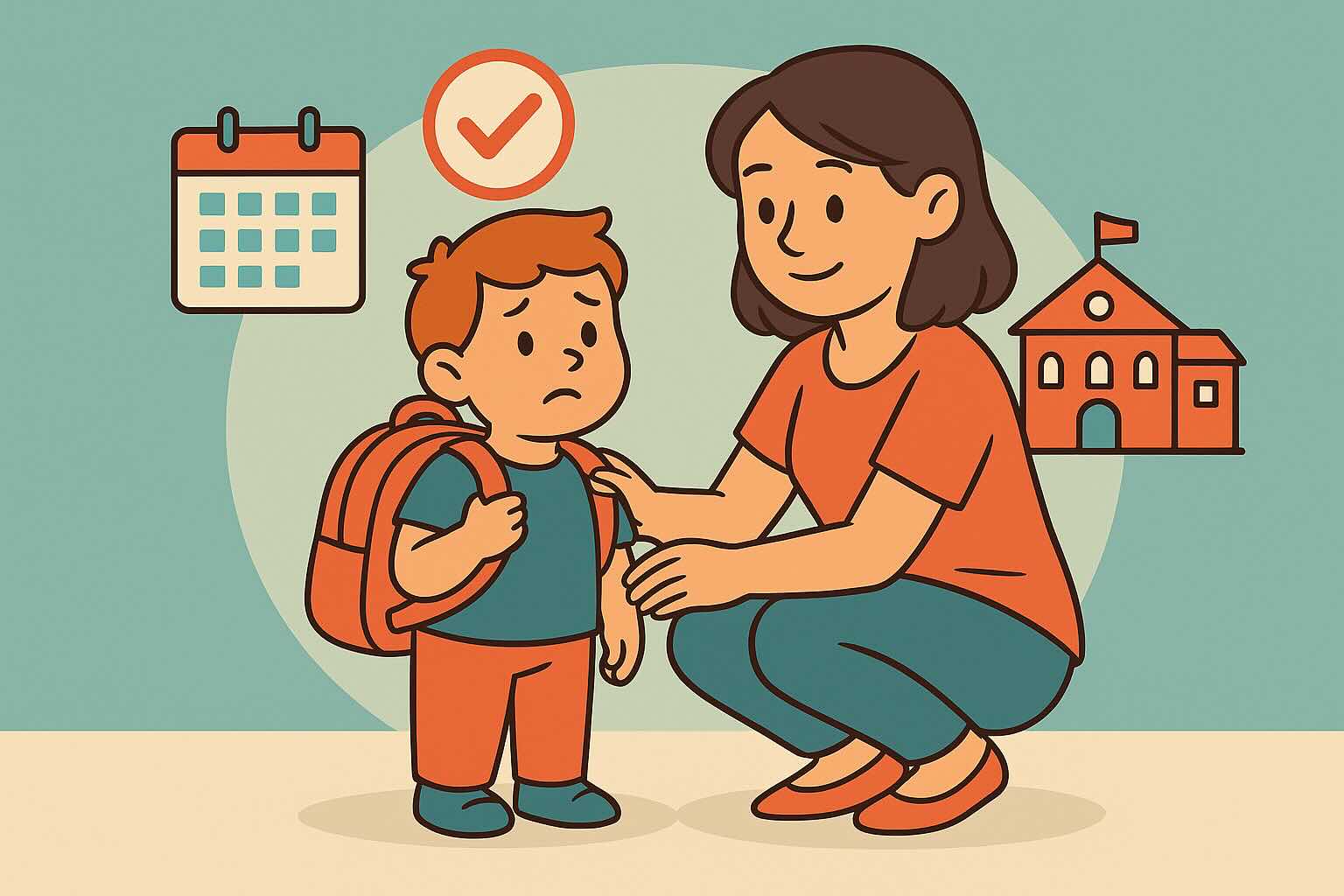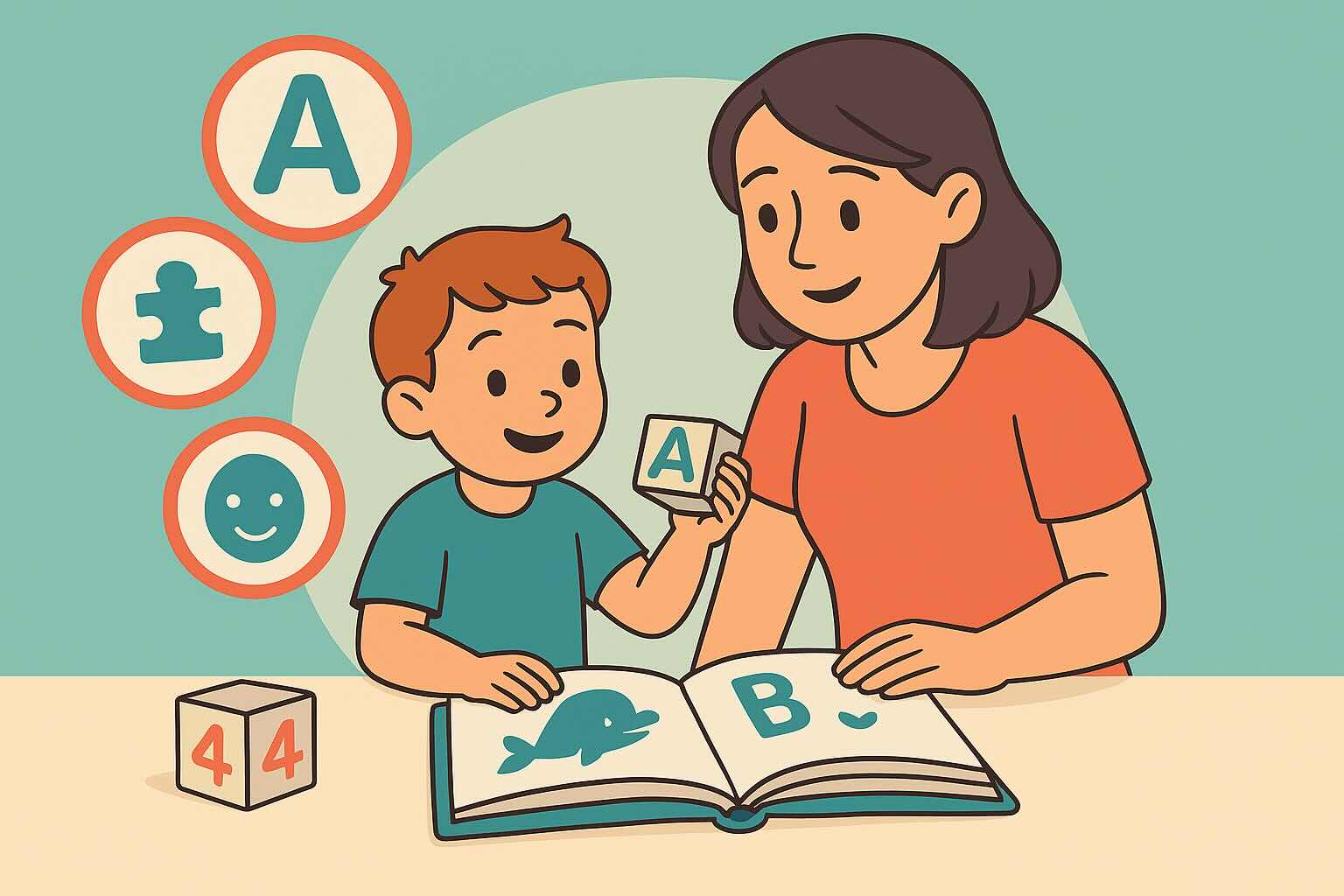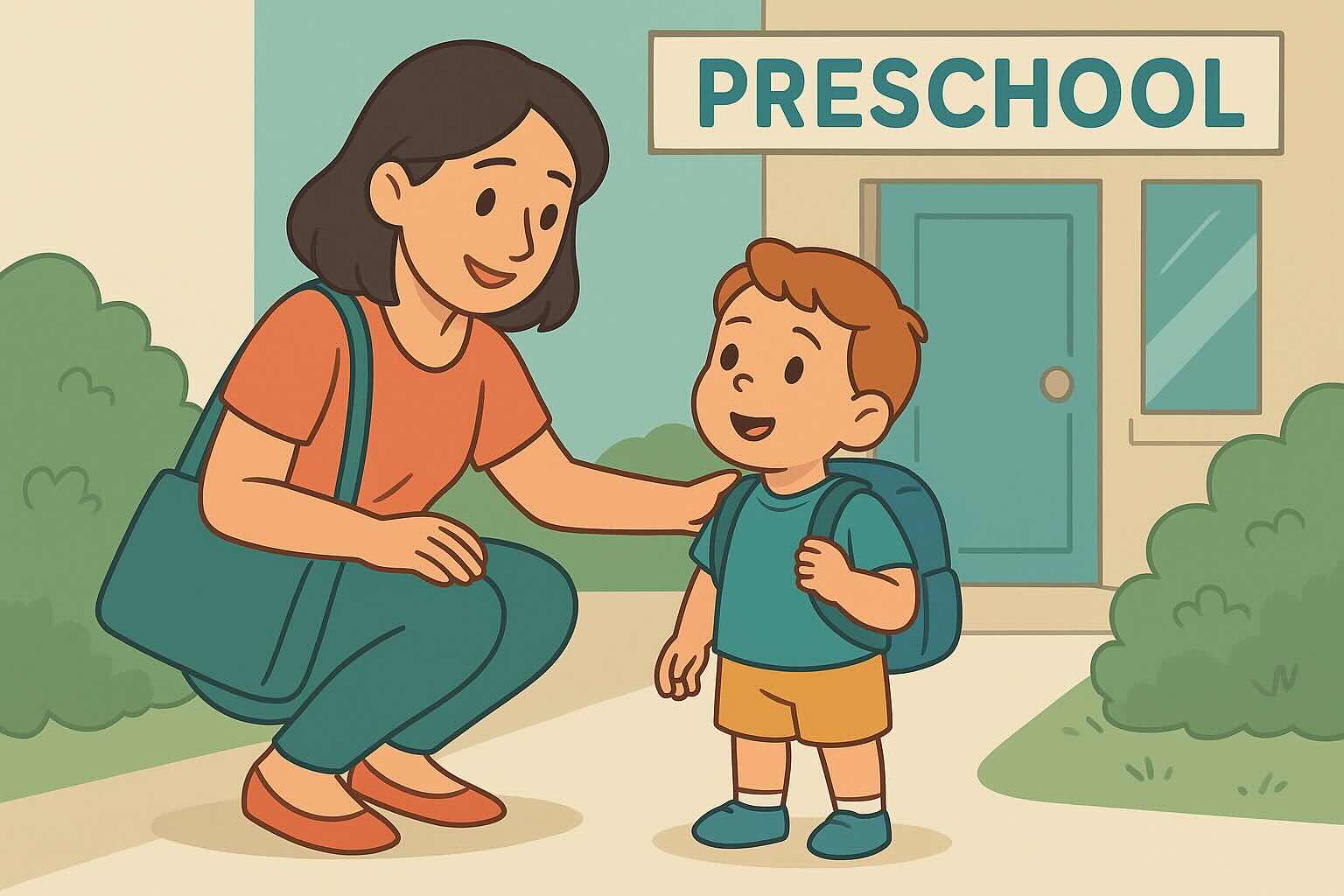Starting School: Complete Parent's Guide to First Day Success


The first day of school represents one of childhood's biggest transitions—and it can feel overwhelming for both you and your child. Whether it's preschool at 3 or kindergarten at 5, research shows that 85% of children experience some anxiety about starting school, but with proper preparation, most children thrive within 2-6 weeks.
This comprehensive guide provides evidence-based strategies from educational psychology research and child development experts. You'll get practical tools to transform this major life change from a source of stress into an exciting milestone.
For related challenges, also check out our moving with children guide, routine change strategies, new sibling preparation, and family visit planning for other major transitions.
What You'll Learn in This Guide
- The Science of School Transitions - Why starting school feels so overwhelming and how children adapt
- 2-Month Preparation Timeline - Exactly when and how to prepare your child step-by-step
- Essential School Readiness Skills - The 8 most important abilities for school success
- Separation Anxiety Solutions - Proven strategies for tearful drop-offs and pickup transitions
- Age-Specific Approaches - Different strategies for 3-year-olds vs. 6-year-olds
- When to Seek Additional Support - Red flags and resources for children who need extra help
- Real Family Success Stories - How other parents navigated first school experiences
Estimated reading time: 12 minutes
Why Starting School Feels So Big: The Psychology of Major Transitions
Your Child's Perspective: A Whole New World
For your child, starting school represents multiple simultaneous changes:
- Environment: New building, classroom, smells, sounds, and visual stimulation
- People: New teacher, classmates, and adult authority figures
- Routine: Different schedule, activities, and expectations than home
- Independence: Longer separation from parents and increased self-reliance demands
- Social dynamics: Group interaction, sharing, waiting turns, and peer relationships
This combination of changes can overwhelm even confident children because their developing brains prefer predictability and familiar environments for feeling safe.
The Neuroscience of Big Changes in Early Childhood
Children's brains are wired to perceive unfamiliar situations as potential threats. The stress response system (fight, flight, or freeze) can activate even during positive changes like starting school.
Normal stress responses include:
- Increased clinginess and need for parent proximity
- Sleep disruption or changes in sleep patterns
- Appetite changes or pickier eating
- Regression in previously mastered skills (toileting, independence)
- More frequent emotional outbursts or sensitivity
- Physical complaints (stomachaches, headaches) without medical cause
Important: These responses are temporary and typically resolve within 4-6 weeks as children adapt to new routines and build confidence.
Individual Differences in Transition Sensitivity
Naturally adaptable children may adjust within 1-2 weeks and show excitement about new experiences.
Sensitive or cautious children may need 6-8 weeks and require more preparation and support.
High-intensity children might have stronger emotional responses but often adapt well once they feel secure.
Consider your child's temperament when setting realistic expectations and choosing preparation strategies.
The 8-Week School Preparation Timeline
8 Weeks Before: Start Conversations and Gather Information
Begin talking about school positively and factually:
- "In a few months, you'll start going to school. School is a place where children learn new things and make friends."
- "You'll have a teacher who will help you learn and play."
- "There will be other children there who are learning too."
Gather practical information:
- Visit the school website and look at photos together
- Find out your child's teacher's name if possible
- Learn about daily schedule, lunch procedures, and school policies
- Connect with other families who attend the school
6 Weeks Before: Increase Independence Skills
Focus on practical school readiness:
- Practice opening lunch containers, water bottles, and snack packages
- Work on bathroom independence (wiping, handwashing, managing clothing)
- Practice putting on and taking off jacket, shoes, and backpack
- Encourage asking for help using words instead of gestures or whining
Begin routine adjustments:
- Gradually shift bedtime and wake-up time toward school schedule
- Practice sitting quietly for 15-20 minute periods
- Introduce structured activities that require following instructions
4 Weeks Before: School Visits and Routine Practice
Visit the school environment:
- Tour the building during off-hours if possible
- Explore the playground and outdoor spaces
- Walk or drive the route you'll take to school
- Meet the teacher if summer meetings are available
Practice school-like routines:
- Morning routine: wake up, get dressed, eat breakfast, brush teeth
- Pack and unpack a practice backpack
- Practice raising hand to ask questions or get attention
- Try group activities where your child needs to wait for turns
2 Weeks Before: Final Preparations and Emotional Support
Address fears and excitement:
- Read books about starting school together
- Talk about what to expect: "First you'll hang up your backpack, then sit on the carpet for morning meeting."
- Practice deep breathing or other calming strategies
- Create a special "first day of school" plan or ritual
Finalize logistics:
- Shop for school supplies together, letting child help choose when appropriate
- Practice the morning routine including travel time to school
- Arrange playdates with future classmates if possible
- Prepare backup plans for challenging situations
Essential School Readiness Skills (More Important Than ABCs)
1. Communication and Self-Advocacy
Your child should be able to:
- Ask for help using words: "I need help opening this" or "I don't understand"
- Express basic needs: "I need to use the bathroom" or "I'm hungry"
- Communicate discomfort or problems to adults
- Use "please" and "thank you" in interactions
How to practice:
- Role-play asking teachers for help with different scenarios
- Practice speaking clearly and making eye contact with unfamiliar adults
- Encourage your child to place their own orders at restaurants or ask store employees questions
2. Independence in Personal Care
Critical self-care abilities:
- Use the bathroom independently (wiping, flushing, handwashing)
- Manage clothing (buttons, zippers, shoes with minimal assistance)
- Open food containers and eat lunch within 20-30 minutes
- Blow nose and dispose of tissues appropriately
- Put on and remove jacket or sweater
Practice strategies:
- Create opportunities for independence at home
- Use clothing with easy fasteners while building skills
- Practice lunch opening and eating with time limits
- Make personal care routines consistent and automatic
3. Emotional Regulation and Coping Skills
Emotional readiness includes:
- Ability to calm down with minimal adult support
- Express frustration without hitting, biting, or extreme aggression
- Accept comfort from unfamiliar adults when upset
- Handle disappointment when things don't go as expected
- Ask for help when feeling overwhelmed
Building emotional skills:
- Practice calming strategies during non-stressful times
- Read books about emotions and discuss feelings regularly
- Model emotional regulation in your own responses to frustration
- Create predictable routines that help your child feel secure
4. Social Interaction Basics
Important social abilities:
- Share materials and take turns (even when difficult)
- Play alongside other children without constant adult mediation
- Follow group instructions and wait for individual attention
- Show empathy when others are hurt or upset
- Engage in simple collaborative activities
Social skill development:
- Arrange regular playdates with multiple children
- Practice turn-taking games and sharing activities
- Discuss social situations and appropriate responses
- Model kind, respectful interaction with others
Handling Separation Anxiety: The Drop-Off Strategy
The Science of Separation Anxiety at School
Separation anxiety during school transitions is completely normal and actually indicates healthy attachment. Research shows that 70% of children experience some distress during school drop-offs initially, but most adapt within 2-3 weeks.
Why separation feels harder at school:
- Unfamiliar environment increases anxiety
- Longer separation time than children may be used to
- New caregivers who haven't yet built trust
- Less predictable schedule compared to home routines
The 5-Step Drop-Off Method
Step 1: Create a Consistent Goodbye Ritual Develop a special, brief routine that's the same every day:
- Special hug and kiss combination
- Encouraging phrase: "Have a great day learning!"
- Visual reminder: "I'll be back after snack time"
- Transitional object if school allows (small photo, special stone)
Step 2: Keep Goodbyes Short and Sweet (2-3 Minutes Maximum)
- Avoid prolonged discussions about your return
- Don't sneak away, but don't linger either
- Stay calm and confident in your voice and body language
- Trust that tears often stop within 5-10 minutes after you leave
Step 3: Validate Feelings While Maintaining Confidence
- "It's hard to say goodbye AND you're going to have a good day"
- "I understand you feel sad AND I know you can do this"
- "Your teacher will take good care of you while I'm at work"
Step 4: Give Control Where Possible
- Let child choose which transition object to bring
- Offer choice about walking or being carried to classroom
- Allow them to hang up their own backpack or put away lunch
Step 5: Follow Through Consistently
- Don't return unless truly necessary (emergencies only)
- Pick up on time to build trust
- Ask about their day with specific, positive questions
When Drop-Offs Continue to Be Difficult
After 3-4 weeks of continued distress:
- Consult with your child's teacher about classroom strategies
- Consider shorter days or gradual increase in school hours
- Evaluate if there are specific triggers (crowded classroom, loud noises, particular activities)
- Check if your own anxiety about separation is affecting your child
Age-Specific School Transition Strategies
Ages 3-4: Preschool and Pre-K Transitions
Developmental considerations:
- Limited language for expressing complex emotions
- Shorter attention spans (10-15 minutes for structured activities)
- Higher need for physical comfort and familiar routines
- Less experience with group settings and sharing
Strategies that work:
- Use simple, concrete language about school: "First play, then snack, then stories"
- Practice very short separations (grocery store childcare, brief playdates)
- Focus heavily on play-based learning and social interaction
- Allow extra time for transitions and routine establishment
- Emphasize fun aspects: "You'll get to paint and play with new toys!"
Common challenges:
- Difficulty with bathroom independence
- Sharing toys and materials with peers
- Following group instructions
- Managing emotions without parent support
Ages 4-5: Pre-K and Kindergarten Transitions
Developmental readiness:
- Better language skills for expressing needs and feelings
- Increased attention span (15-20 minutes for focused activities)
- Growing independence in self-care
- More experience with social interaction and group activities
Preparation focuses:
- Academic readiness: recognizing letters, numbers, colors, shapes
- Independence: managing personal belongings and following multi-step instructions
- Social skills: conflict resolution, empathy, cooperative play
- Emotional regulation: coping with frustration and disappointment
Common concerns:
- Performance anxiety about academic expectations
- Social comparison with peers
- Longer school days and structured learning time
- Increased independence expectations
Ages 5-7: Kindergarten and Early Elementary
Advanced preparation needs:
- Understanding of school rules and consequences
- Ability to focus for 20-30 minutes on learning tasks
- Basic academic skills: letter recognition, counting, writing name
- Social problem-solving and conflict resolution
Transition strategies:
- Discuss academic expectations realistically
- Practice homework-like activities and following directions
- Build stamina for longer days and multiple transitions
- Encourage self-advocacy and asking questions when confused
Unique challenges:
- Homework and academic pressure
- Peer relationships and social dynamics
- Comparison to siblings or other children
- Balancing structure with creativity and free play
When to Seek Additional Support
Red Flags That May Indicate Need for Professional Help
After 6-8 weeks of school attendance:
- Extreme separation anxiety that doesn't improve
- Regression in multiple developmental areas (speech, toileting, social skills)
- Persistent sleep disruption or nightmares about school
- Physical symptoms with no medical cause (frequent stomachaches, headaches)
- Aggressive behavior toward parents, siblings, or peers that's new or escalating
- Complete refusal to discuss school or participate in school-related activities
Academic or developmental concerns:
- Significant difficulty following simple instructions
- Inability to communicate basic needs to teachers
- Extreme aggression or withdrawal in social situations
- Persistent difficulty with independence skills despite practice
Types of Support Available
School-based resources:
- School counselors for social-emotional support
- Special education evaluation if developmental delays are suspected
- Occupational therapy for sensory or motor skill challenges
- Speech therapy for communication difficulties
Community resources:
- Child psychologists specializing in anxiety and transitions
- Occupational therapists for sensory processing issues
- Family therapists for family stress related to school transitions
- Developmental pediatricians for comprehensive evaluation
How to Advocate for Your Child
- Document concerns with specific examples and timing
- Communicate regularly with teachers about your child's needs
- Request school meetings if multiple concerns arise
- Ask about available accommodations or support services
- Trust your parental instincts while remaining open to professional guidance
Real-Life School Transition Success Stories
Maria's Story: Overcoming Preschool Separation Anxiety
"My 3-year-old Sofia cried every morning for 6 weeks at preschool drop-off. I felt like a terrible mother leaving her upset every day. The teachers suggested a special goodbye ritual and transitional object. We created a 'hug-kiss-high five' routine and she brought a small photo of our family. I also practiced very short separations at home first. By week 7, she started running to the art table instead of clinging to me. It took almost 2 months, but now she loves school and asks to go on weekends!"
David's Story: Kindergarten Readiness Concerns
"My son Alex seemed young for kindergarten—he couldn't write his name and was still having accidents. I worried he wasn't ready. We focused on independence skills instead of academics over the summer: opening lunch containers, managing bathroom needs, and asking for help. His teacher said those skills mattered much more than knowing letters. He struggled the first month but caught up academically by October. The independence skills made the biggest difference in his confidence."
Jennifer's Story: Moving and Starting School Simultaneously
"We moved across the country the month before Emma started first grade—double transition stress! I was worried about overwhelming her, but we treated both as adventures. We visited the new school multiple times, found local parks and library, and connected with neighbors who had kids her age. The first two weeks were rough with some bedtime fears and clingy behavior, but having familiar routines in our new home helped. By week 4, she had made friends and felt comfortable. The key was acknowledging that both changes were big and giving her extra emotional support."
Your 4-Week School Success Action Plan
Week 1: Assessment and Foundation Building
- Honestly assess your child's current independence and social skills
- Begin daily practice of school-morning routine without pressure
- Start conversations about school using positive, factual language
- Address any medical or developmental concerns with pediatrician
Week 2: Skill Building and Environment Preparation
- Focus intensively on self-care independence (bathroom, dressing, eating)
- Practice following instructions and asking for help appropriately
- Visit school building and playground if possible
- Read school-themed books and discuss what to expect
Week 3: Routine Implementation and Social Practice
- Implement full school routine including wake-up, breakfast, and travel timing
- Arrange playdates or group activities to practice social skills
- Meet the teacher if possible and discuss any concerns or special needs
- Practice calming strategies and coping skills during stressful moments
Week 4: Final Preparation and Confidence Building
- Finalize all logistics: supplies, lunch plans, transportation
- Do a practice run of the full morning routine including drive to school
- Focus on excitement and positive anticipation while acknowledging any worries
- Plan special first-day traditions or celebrations
Ongoing: Support and Adjustment
- Monitor your child's adjustment with realistic expectations
- Communicate regularly with teachers about successes and challenges
- Maintain consistent routines while allowing flexibility for adaptation
- Celebrate small victories and progress milestones
Building Long-Term School Success
The Skills That Matter Most
Research consistently shows that social-emotional skills predict school success more strongly than early academic abilities. Children who can regulate emotions, communicate needs, and build relationships with teachers tend to thrive academically.
Focus on developing:
- Resilience and problem-solving when facing challenges
- Curiosity and love of learning rather than performance pressure
- Friendship skills and empathy toward others
- Self-advocacy and confidence in asking for help
- Growth mindset: understanding that learning takes practice and mistakes are normal
Creating Home-School Partnership
Effective communication with teachers:
- Share important information about your child's personality, interests, and needs
- Ask specific questions: "How did Sofia handle the transition to art class today?"
- Offer support: "What can we practice at home to help with classroom routines?"
- Address concerns early rather than waiting for problems to escalate
Supporting learning at home:
- Create a quiet space for homework and school materials
- Establish consistent after-school routines that include down time
- Show interest in your child's school experiences without interrogating
- Model lifelong learning and curiosity in your own activities
Key Takeaways: Your School Transition Success Guide
- ✅ Starting school anxiety is completely normal and affects 85% of children initially
- ✅ Most children adjust within 2-6 weeks with proper preparation and support
- ✅ Independence skills matter more than academic abilities for early school success
- ✅ Consistent goodbye routines help separation anxiety more than prolonged departures
- ✅ Gradual preparation over 8 weeks is more effective than last-minute cramming
- ✅ Individual temperament affects adjustment timeline - sensitive children may need longer
- ✅ Professional support is available if concerns persist beyond 6-8 weeks
- ✅ Social-emotional skills predict long-term success more than early academics
- ✅ Home-school partnership supports adjustment and ongoing learning
Remember: Every child's school journey is unique. Trust your child's resilience while providing the emotional support and practical preparation they need to thrive.
This article is based on educational psychology research and child development science. Individual experiences vary significantly based on child temperament, family circumstances, and school environment. Always consult with teachers, school counselors, or your pediatrician if you have concerns about your child's school transition or adjustment.
24/7 AI Parenting Assistant
Get instant, personalized advice with expert-curated parenting knowledge. Chat with your AI coach anytime, anywhere.

Routine Transition Planner
4-week method for implementing routine changes successfully with gradual strategies and resistance management techniques.
Frequently Asked Questions
Need personalized support?
RootWise's AI coach can provide tailored strategies for your specific situation, available 24/7 when you need it most.
Learn More About AI Coaching →



